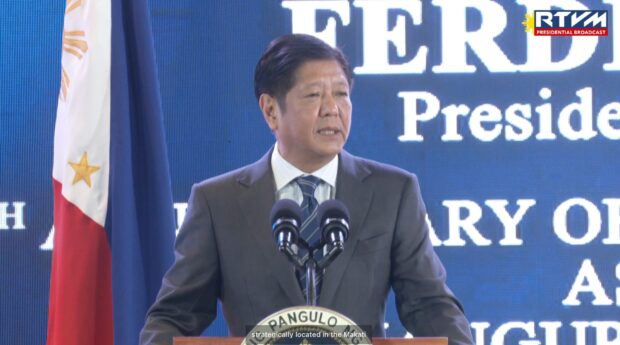
President Ferdinand “Bongbong” Marcos | PHOTO: RTVM
President Ferdinand Marcos Jr. has assured investors that the Philippines would shun protectionist measures as part of efforts to attract more foreign direct investments to the country.
“If we are to compete on an even basis… we cannot continue to hide behind protectionist laws and protectionist policies. Because no country ever got wealthy by following a protectionist policy,” Mr. Marcos said in his speech on Thursday morning during the launch of the green lanes for strategic investments.
Protectionism refers to a policy of protecting local companies and industries against foreign competition through such measures as tariffs, import quotas, subsidies and ownership restrictions.
Mr. Marcos, however, has set a clear policy direction and signaled to investors and trading partners that the Philippines is “open for business,” according to National Economic and Development Authority Secretary Arsenio Balisacan.
The government, for example, has enabled the effective implementation of key measures such as the amendments to the Public Services Act, Foreign Investments Act and Retail Trade Liberalization Act that opened up more sectors of the economy to foreign investments.
Mr. Marcos pointed out that trade has been the key to the wealth of any nation.
Green lanes
In line with this thrust, the green lanes for strategic investments were launched on Thursday.
Strategic investments refer to projects seen to bring in significant capital into the country and positive economic impact.
Renewable energy, food security, digital infrastructure, data center, pharmaceuticals and electric vehicles are sectors identified as strategic by the Department of Trade and Industry’s (DTI) Board of Investment (BOI).
Mr. Marcos said that if the Philippines wanted to “compete vigorously” with its Asian neighbors, the Philippines would “have to compete in terms of the ease of doing business.”
In February this year, Mr. Marcos signed Executive Order No. 18 that established the green lanes to make it easier for strategic and priority investments to come in by cutting lengthy red tape and avoiding unnecessary delays in processing regulatory permits and licenses that turn off investors, thus making the Philippines lose out on potential job-generating foreign investments.
It also provided for the setup of the One-Stop Action Center for Strategic Investments.
Mr. Marcos said the green lanes would pave the way for the realization of the investment pledges amounting to P3.48 trillion that he secured during his 13 trips abroad. This year, the target is to secure P1.5 trillion worth of pledges.
He also cited the launch of e-Invest, an online platform for investors to submit applications to operate in the country, where they can also be granted a Provisionary Permit while waiting to be approved.
Quicker process
“We understand that time is of the essence for our investors and our entrepreneurs. Thus, a streamlined bureaucracy will ensure that our processes are efficient, transparent, and responsive to the needs of these potential investors,” he said.
He said the government has shortened the processing of permits and clearances from 80 days to 20-plus days. In countries like Vietnam, South Korea and Indonesia, however, it takes only three days.
Mr. Marcos conceded that the Philippines still had a long way to go, citing cases where permits took 36 months to be secured.
At the same event, Trade Secretary Alfredo Pascual reported that SunAsia Energy was the first entity to receive a certificate of endorsement for green lanes.
The renewable energy developer is set to build floating solar panels on Laguna Lake to produce 1.3 gigawatts of power, he said.
“As we all know, the successful and expeditious implementation of investments will translate into more stable and higher-paying jobs for our people without unnecessary delays,” he said.
In January to May, BOI approved P532.2 billion worth of investments, up by 158.7 percent from P205.7 billion in the same period last year.
The bulk or 76 percent of the greenlighted projects were from foreign investors looking to finance ventures in renewable energy, including wind and solar power.
Pascual said the country generated P3.5 trillion worth of investment leads from Singapore, Indonesia, United States, Japan, China, Thailand and Europe over the past few months through his agency’s investment missions.
RELATED STORY:
Foreign investments flow into PH down by a third in March